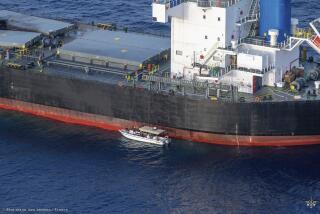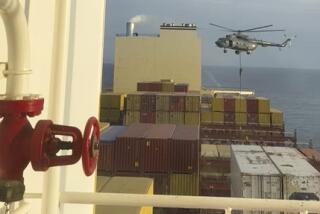Syrian Refusal a Turning Point : ‘Ship Without a Country’ Had 1 Option--Surrender
- Share via
WASHINGTON — The strange, short voyage of four Palestinian terrorists who seized the Italian cruise ship Achille Lauro came to an abrupt end largely because the hijackers ran out of allies and found no safe harbor, U.S. and Italian officials said Wednesday.
Intelligence analysts, terrorism scholars and Palestinian specialists are still arguing over who the Achille Lauro’s hijackers were, why they seized the ship and what they intended to do with it.
But officials said that some major factors in the hijacking’s end are clear and help explain why the ordeal of the Achille Lauro lasted only 50 hours--compared with earlier crises such as the 17-day drama of TWA Flight 847, which was hijacked to Beirut in June.
The hijacking itself did not appear well-planned. It was quickly denounced by almost every Arab government and almost every faction of the Palestine Liberation Organization. A ship on the high seas did not offer the hour-by-hour television exposure that terrorists count on to increase their leverage.
The United States, Italy and Israel managed to hold firm against meeting the terrorists’ main demand, the release of some 50 Palestinian prisoners in Israeli jails. “They were sweated out of their conditions,” said Richard W. Murphy, assistant secretary of state for Middle Eastern affairs. “They saw no prospect of getting their demands.”
And perhaps most important of all in giving negotiators the leverage they needed to prevent this from becoming another protracted crisis, Syria responded to a U.S.-Italian diplomatic blitz and refused to allow the ship to land. That apparently convinced the terrorists that their game was lost.
“That was a turning point,” said a Defense Department official, speaking on condition that he not be identified. “It left them a ship without a country.”
To achieve that end, Pentagon and State Department officials said, the United States sent a forceful diplomatic message to Syrian President Hafez Assad, warning that he would be held responsible for the hijacking if he allowed the Achille Lauro to dock on Syria’s Mediterranean coast.
“We presented our views to the Syrian government . . . fairly early on,” a Pentagon official said. Had the ship docked in Syria, he said, “we could have had a much more serious condition.”
The Achille Lauro approached Syria’s port of Tartus on Tuesday, but after several radio exchanges with the harbormaster, the ship was turned away. Authorities on the nearby island of Cyprus said they also barred the liner from their ports.
Officials have said that preventing hijackers from finding a safe haven was one of the key lessons of the hijacking of TWA Flight 847, when the terrorists were joined by reinforcements in Beirut and eventually moved their captives to hiding places in that city, lengthening the siege.
In this week’s incident, Italian, Egyptian and Palestine Liberation Organization officials also worked to convince the terrorists that they had no support--even in the Arab world--and should give up in exchange for immunity from prosecution.
‘Everyone Did His Part’
“We aimed at weakening and isolating (the hijackers), first politically and then in actual fact,” Italian Prime Minister Bettino Craxi told a news conference. “Everyone did his part. Syria prevented the docking of the ship in its ports and forced it to find other moorings, which it did not find.
“The PLO became involved, and favored a positive solution. All these actions put the hijackers in a situation of weakness, and all the paths were closed except those of surrender,” Craxi said.
“The Egyptians and the Italians worked hard on this,” the Pentagon official said. “They certainly should get credit.”
The precise role played by the PLO is a matter of lively dispute--turning in large part on the still-unresolved issue of who planned the hijacking in the first place.
Aides to PLO Chairman Yasser Arafat declared that they deserved some recognition for helping to end the hijacking, pointing out that they appealed to the terrorists to give up and helped Egyptian officials arrange the actual surrender.
PLO Denies Role
The Arafat aides repeated their denials of responsibility for the seizure and charged that it had been carried out by an anti-Arafat wing of the Palestine Liberation Front, a small and splintered guerrilla faction.
But the government of Israel, in a briefing for reporters, offered an alternative theory: Arafat was able to end the hijacking, they said, because he ordered it in the first place.
The Israelis said secret intelligence sources told them that the terrorists were members of the Palestine Liberation Front’s pro-Arafat faction and that they originally intended to use the Achille Lauro merely as transportation to the Israeli port of Ashdod, where they planned an unspecified attack.
But then, the Israelis said, something went wrong and the terrorists were panicked into commandeering the ship. They offered no specific evidence to support the charge.
The different wings of the Palestine Liberation Front, not unexpectedly, blamed each other.
U.S. officials said they don’t know whose version is true.
‘Can’t Be Sure Why’
“We know the PLO sent a message to the ship to surrender,” a State Department official said. “We can’t be sure why and we don’t know what effect it had.”
Non-governmental experts said it appears unlikely that Arafat ordered the hijacking. They point out that he has been working to improve his relationship with Egypt and that pirating a cruise ship from an Egyptian port would run counter to that aim.
“Arafat’s denials seem pretty credible,” said Ray S. Cline, an expert at Georgetown University’s Center for Strategic and International Studies and a former deputy director of the CIA. “It’s probably a splinter faction of the Palestine Liberation Front that has no real leader.”
Cline said the terrorists appeared “amateurish.”
“They overreached what they were capable of doing,” he said. “There were only four of them, trying to hold an entire ship.
“And they failed to do something every successful terrorist needs to do and that is to arrange for television coverage. If I had been the chief hijacker, my first demand would have been for a pool of U.S. television reporters.”
Cline continued:
“They probably hoped to get the ship into port, threaten to blow it up, get additional supporters on board, get television crews in, dominate the situation the way they did in Beirut. In that sense, the Administration did well by organizing the Italians and Egyptians and making sure the ship had no place to land.
“They ended up just sailing out in the middle of the ocean, and that didn’t do them much good,” he concluded. “They even murdered a passenger and nobody knew about it. . . . They just didn’t have a strong hand.”
More to Read
Sign up for Essential California
The most important California stories and recommendations in your inbox every morning.
You may occasionally receive promotional content from the Los Angeles Times.














